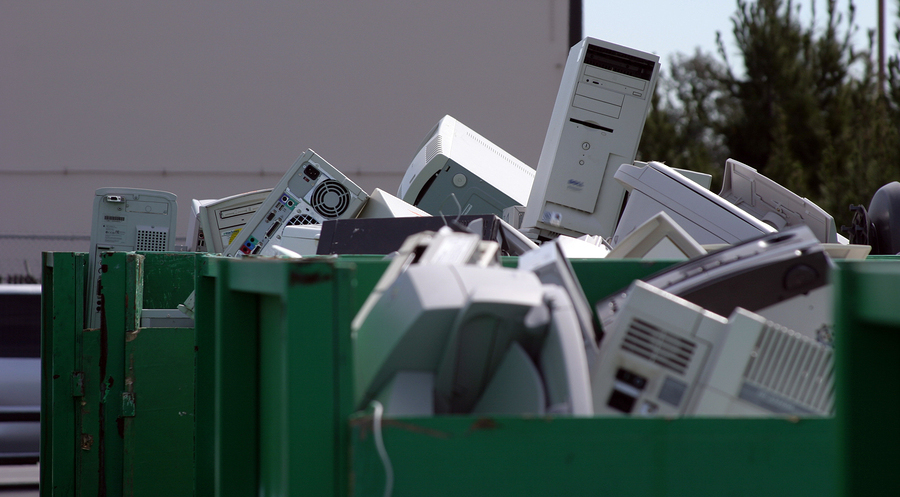Sustainability can provide great benefits to a middle market business, including cost reduction and customer and employee loyalty. But claiming sustainable practices is difficult if you don't effectively handle e-waste. Whether it's outmoded computers, broken fax machines, CRT monitors, exhausted rechargeable batteries or obsolete networking equipment or smartphones, a lot of electronic waste is poorly handled.

The Environmental Protection Agency (EPA) estimated that through 2009, organizations recycled only a minority of products ready for end-of-life management, including:
- 40 percent of computers.
- 33 percent of computer displays.
- 33 percent of printers.
- 10 percent of keyboards and mice.
- 17 percent of TV sets.
- 11 percent of mobile devices.
E-waste is small when compared to overall waste, representing just 2 percent of the material in landfills. But, according to social change organization DoSomething.org, it represents 70 percent of overall toxic waste.
Electronics require some of the rarest minerals and materials available in a world with finite resources, making landfills a bad choice. In addition, dumping old products eliminates the chance of seeing any financial return from handling the waste in a more effective manner. There are four ways that companies can manage e-waste, increase a commitment to sustainability and even save money (because putting things into a landfill isn't cheap).
1. Repair and Upgrade
Just because a device is older doesn't mean it's worthless. Ask your information technology (IT) department for a cost-benefit analysis for repairing or upgrading old gear. It might be that some equipment could get a face-lift with easy improvements such as additional memory, a larger hard drive or even the latest version of software. Some IT equipment can gain new capabilities with a firmware upgrade, which means replacing the lowest level of software with a new version. Reconditioned products might let you equip employees at a lower cost, helping eliminate financial waste.
2. Sell or Swap
Old computers don't necessarily have a lot of value to many people, although you can check eBay and other sites that allow individuals and companies to sell used products. It may be that what no longer has worth to you might be helpful to someone else. However, be sure that the IT department wipes any equipment being sold or swapped to prevent the loss of confidential information. That can include customer data in addition to proprietary corporate material.
When it comes to mobile electronics, the chance of reclaiming value is even better. Companies such as Swappa, Gazelle, uSell and iReTron are marketplaces to buy, sell and trade in old smartphones and tablets. In some cases, the devices may not even have to work.
3. Donate
Another possibility is to donate electronics. You don't get cash, but your accounting department and lawyers can tell you whether there could be a tax deduction available. A variety of charities accept old electronics. Some send computers, phones or tablets to classrooms in developing countries. Others provide products to hospitalized children, or resell items through a third party and only take a portion of the proceeds to run their operations. As with selling or swapping, be sure there is no confidential or personal information left on the devices.
4. Recycle
The final option is to recycle products. Depending on the volume, you might be able to use free services offered by manufacturers and specialty retailers, or use commercial services that can handle bulk recycling. The EPA provides a list of companies and the devices they will take. However, this option can be tricky. Recycling companies vary in how stringently they do their work. According to Bloomberg Business, some companies send products to developing nations without taking proper precautions regarding how the recycling is done or how much toxic material might be released in the process. There are two EPA-endorsed programs, e-Stewards and R2, but even then, the quality can vary. If a recycler charges nothing for the service and even hauls the products away, be sure it doesn't cut corners.
Electronic waste presents an opportunity for organizations to get back some of their investment and even demonstrate a commitment to environmental conscientiousness. Just be sure you're using the proper outlets, and that your services of choice operate in an eco-friendly, responsible manner.
Has your company ever discarded a large amount of electronic waste? How did you do it, and what outlets did you use? Did you have any concerns regarding a service's environmental responsibility? Tell us by commenting below.
Erik Sherman is an NCMM contributor and author whose work has appeared in such publications as The Wall Street Journal, The New York Times Magazine, Newsweek, the Financial Times, Chief Executive, Inc. and Fortune. He also blogs for CBS MoneyWatch. Sherman has extensive experience in corporate communications consulting and is the author or co-author of 10 books. Follow him on Twitter.